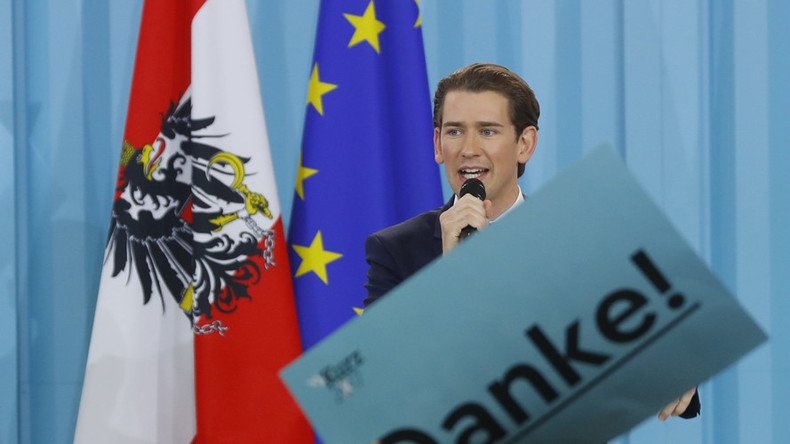Sebastian Kurz, most talented Austrian leader since WWII, will toughen immigration laws – analysts

Kurz was responsible for closing the Western Balkan immigration route, from Turkey to Germany and to Scandinavia, explains Werner Fasslabend of the Austrian Institute for European Policy & Security. Political scientist Heinz Gaertner also gives his insight.
The results of Sunday's Austrian parliamentary elections show a clear shift to the right.
Sebastian Kurz, leader of the Austrian People’s Party (OVP), is poised to become Chancellor after his center-right group secured around 31 percent of the vote. The right-wing Freedom Party (FPO) with leader Heinz-Christian Strache is set to grab second place with over 27 percent.
Both parties support the tightening of Austria's borders and toughening up on immigration.
Rise of the right: #AustriaElection results & their implications for Europe https://t.co/qvte6ZVYPE
— RT (@RT_com) October 16, 2017
Werner Fasslabend, Austrian Institute for European Policy & Security
RT: The two top parties in the election are center-right and far-right. How much has today's result changed the face of Austria?
Werner Fasslabend: I think there will be a change – but more or less a change in the reform agenda – not so much in the political specter, because the top number-one party is a center-right party, and it will continue this way of centrist politics in the future.
RT: Sebastian Kurz is to be the next Chancellor of Austria. He is 31 and was a foreign minister before, so he has got some experience on the world scene. How do you think he is going to perform as a Chancellor?
WF: He is the most talented, the most gifted politician in the last decades, probably one of the most talented politicians in Austria since WWII. He has already quite some experience because at the age of 24 he became state secretary, and at the age of 27, he became foreign minister. So far he has been involved in politics for almost a decade actively in government. Therefore, he also will be the most experienced politician…from any party in Austria.
Kurz was responsible for closing the Western Balkan route, which led from Turkey up to Germany and to Scandinavia. He was the one who organized, together with countries like Macedonia, Serbia, and Slovenia that this route for illegal migrants became closed. Since then, the number of migrants decreased very much…. He proved that he will be able to do something because this was more or less the cornerstone of the politics that was overtaken by the EU, and even by Angela Merkel, even if she did not like this very much at the beginning.
31yo #OVP head Sebastian #Kurz declares victory in Austrian snap election, will become Europe’s youngest leader https://t.co/z6ZlVFjT2Zpic.twitter.com/Yyh8RDRPh4
— RT (@RT_com) October 15, 2017
Heinz Gaertner, Political scientist, University of Vienna
RT: How do you expect him to fare on the world stage?
Heinz Gaertner: I do think he performed pretty well as a foreign minister, so he will do very well as a Chancellor. I just want to remind you that in Vienna the JCPOA (Joint Comprehensive Plan of Action,) the Iran nuclear agreement has been negotiated, that Austria was the host of it, and Austria was one of the initiators of the Nuclear Ban Treaty, which has been adopted in New York just recently. Also, Austria had the chairmanship of the OSCE, which worked very well. So in terms of foreign policy and Chancellor Kurz, I would not be so worried at all.
RT: The current ruling party the Social Democrats is now in second place. Why are they losing support?
HG: The Social Democrats had bad luck, because of this kind of affair of the advisor to the Social Democrats – it did damage to the Social Democrats. So substance was not the main issue. The issues came up only in the last phase of the campaign, and that was too late for the Social Democrats. Unfortunately for the Social Democrats – this just kind of dominated the debate – did damage to Chancellor [Christian] Kern.
I will not exclude that there will be a government now between the People’s Party and the Social Democrats – still a continuation of the grand coalition, which we had before just with an exchange of the parties. But I do not think that now Chancellor Kern would remain in a coalition with the People’s Party.
RT: Are votes for the conservative People's Party and Euroskeptic Freedom party largely down to failed migration policies?
HG: Both parties have been harsh on immigration. I would even say that Kurz was even harsher than the Freedom Party in this issue. If we have a coalition between the People’s Party and the Freedom Party, we can expect there will be hard immigration laws. So that might be a change. But I have to say in terms of the Euroskeptics, the Freedom Party is the only right-wing party in Europe, which did not call for Austria to leave the EU. Austria will have the presidency this year, so the Freedom Party will not want to be isolated.












